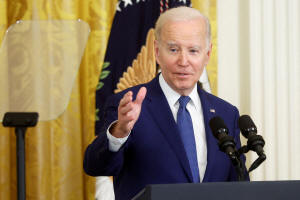Biden holds second democracy summit amid doubts over progress
 Send a link to a friend
Send a link to a friend
 [March 27, 2023]
By Humeyra Pamuk and Simon Lewis [March 27, 2023]
By Humeyra Pamuk and Simon Lewis
WASHINGTON (Reuters) - World leaders will gather virtually this week for
the second U.S.-organized Summit for Democracy, an event critics say
illustrates the halting progress the Biden administration has made in
advancing human rights and democracy as a focus of its foreign policy.
Starting Wednesday, the event involves 120 countries, civil society
groups and technology companies and will include strategically important
nations where rights groups have expressed concerns about the state of
democracy, such as India, Poland and Israel.
Rights advocates have praised the administration for putting a spotlight
on democracy, but say there is little evidence the countries joining the
summit have made progress on improving their democracies, and that there
is no formal mechanism to hold participants to the modest commitments
made at the first meeting.
The administration has also been reluctant to make the hard choices
needed to show it is putting human rights at the heart of its foreign
policy, experts said.

"I think this administration, like any other administration, has just
found that that is too difficult," said Tess McEnery, who worked on
human rights issues in the Biden administration until August 2022 and is
now with the Project on Middle East Democracy.
She added that because the U.S. is unable to drastically change the
relationship with countries vital to its strategic interests like India,
"instead we have a summit."
DEALING WITH DICTATORS
Crises like the war in Ukraine have only made Biden's goal of rallying
democracies against autocratic rulers more difficult.
Washington has accused Russia of committing atrocities in its invasion
and rallied other countries to support Ukraine. But this has sometimes
come at the expense of a firm line on democracy and rights elsewhere,
including in Venezuela, where a U.S. delegation visited in March to try
to convince its authoritarian government to pump more oil.
[to top of second column]
|

U.S. President Joe Biden delivers
remarks on the 13th anniversary of passage of the Affordable Care
Act, commonly known as Obamacare, at the White House in Washington,
U.S. March 23, 2023. REUTERS/Jonathan Ernst

"The Biden administration has gone so far as to ... negotiate with
one dictator to counter another," showing willingness to set aside
principles to address pressing problems, said Christopher
Hernandez-Roy with the Center for Strategic and International
Studies, in a briefing call ahead of the summit.
U.S. officials reject criticism that they have pulled punches on
human rights or democratic backsliding, but say they are aware of
"legitimate criticism" directed at the administration over the
issue.
"I will defend the fact that human rights comes up in every
bilateral relationship we have," a senior Biden administration
official said.
Conceived initially as an in-person gathering, the first summit was
held virtually due to COVID-19. The second summit was delayed by
several months and will now also be mostly online.
The virtual format adds to a sense that the summit has been
de-prioritized, making it harder for participants to push bold
reforms, said one civil society activist, who spoke on condition of
anonymity because they are involved in organizing the summit.
This year's summit will be co-hosted by the United States, Costa
Rica, Zambia, the Netherlands and South Korea, an arrangement that
U.S. officials say will encourage the countries to be more involved
in the process.
(Editing by Don Durfee)
[© 2023 Thomson Reuters. All rights
reserved.]This material may not be published,
broadcast, rewritten or redistributed.
Thompson Reuters is solely responsible for this content.
 |